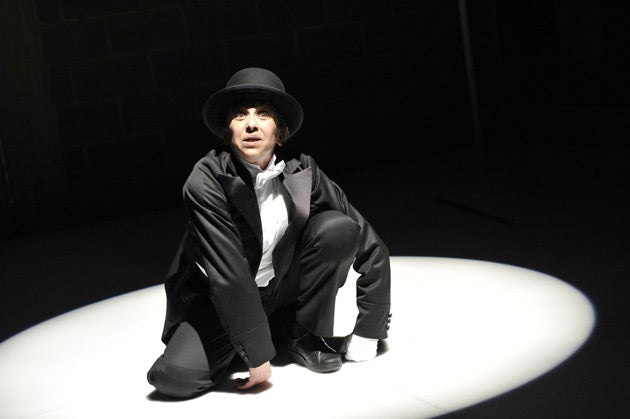Kafka's Monkey, Young Vic, London
Finding the soul of the ape-man

Not many actors get to play King Lear and Richard III, let alone Mother Courage, Lorca's Yerma and the old medieval procuress Celestina. Yet shape-shifting, gender-bending Kathryn Hunter, five foot tall and buckle-limbed, accepts no limitations on her output; playing Cleopatra for the RSC soon will be another digression, not a career climax.
And as Kafka's monkey, Red Peter, you feel that she's not so much extending her range as drawing it in, so that the fear and resignation of the ape-man who has forgotten what it was like to be an animal are signs of physical withdrawal, not development.
"In the entire history of humanity, I reached the cultural level of an average European. In itself this is nothing to speak of ..." The gag is Kafka's in his very short story, "A Report to the Academy", but it is sharpened a bit in Colin Teevan's 40-minute adaptation and delivered with perfect, semi-exhausted insouciance by Hunter, a wizened little gravelly-voiced creature.
Invited to address the "esteemed members" – that's us, the audience in the small Maria studio of the Young Vic – he/she steps hesitantly from the wings, bowing two or three times, all togged up in evening dress, carrying a suitcase, dwarfed by a lectern, and stared at wistfully by a blown-up portrait of the lady chimpanzee who bores him/her.
It's an interesting role because so often Hunter's physicality on stage is a challenge to what we take to be a human being anyway. She breaks all the conventional rules of appearance and sexuality and is unique in combining an external grotesquery with an inner pulsating humanity. So the soul of the ape-man is, as Kafka intended, and as you often felt looking at Guy the Gorilla in Regent's Park zoo for many years, no less than our own.
Red Peter came from the Gold Coast, captured by a big game expedition, transported by ship in a cage, offered not freedom, but different choices of captivity, in a zoo or on the stage. So here he is, human mannerisms laid over the still visible tics and odd screeches of the ape, pressed together by Hunter in her rolling gait, knock-kneed and pigeon-toed, knuckles brushing the ground, big watery eyes seeking our attention.
Freedom, anyway, as the monkey remarks, is an illusion which, when seen through, leads to the profoundest disillusion. We are asked to consider whether the accumulation of skills such as smoking and drinking, or the irradiation of knowledge in the brain, marks a step forward. In rowing to another shore and reporting to the academy, the ape does something, but he and we are not really sure what that is.
Nor do we know how good the act was. A man in the front row is offered a peeled banana, another has his hand shaken. And that's about it. Hunter scuttles away and returns, bathed in smiles, curiously less human now that she adopts a smile of greeting. Then she flips her hat down her arm, and back up on her head, like a music hall turn, the perfect clown, fully installed.
To 9 April (020-7922 2922)
Subscribe to Independent Premium to bookmark this article
Want to bookmark your favourite articles and stories to read or reference later? Start your Independent Premium subscription today.

Join our commenting forum
Join thought-provoking conversations, follow other Independent readers and see their replies